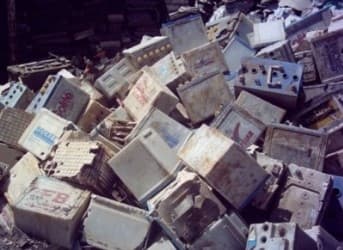The March 2011 nuclear catastrophe at the TEPCO Fukushima Daiichi nuclear power complex has left Japan scrambling for power alternatives, as in the wake of the debacle, the Japanese government shuttered all 57 of the country’s nuclear power plants.
Not surprisingly, renewable energy has experienced a surge of interest in Japan, but most forms of renewable power suffer from a lack of being able to provide reliable power 24/7 – the wind doesn’t always blow, the sun doesn’t always shine.
Accordingly, storage systems of batteries are a high priority worldwide before renewable energy can advance.
The world’s first large-scale solar power storage system to incorporate 16 used electric-vehicle batteries has been built in Japan at a 10 megawatt solar farm in southwestern Japan. Japan’s Ministry of Environment chose the site as a “model project” for evaluating the use of battery storage of renewable energy surplus power generation.
Sumitomo Corp. developed and installed the large-scale power storage system which utilizes used batteries collected from electric vehicles on Yumeshima island, Osaka prefecture, which will begin operating later this month. For the next three years, the Sumitomo Corp. will maintain stable energy output from fluctuations from the "Hikari-no-mori," solar farm close by and will serve as a test bed to establish a large-scale power storage technology by safely and effectively utilizing the huge quantities of discarded used EV batteries which will become available in the future.
In September 2010 Sumitomo Corp. created the 4R Energy Corp. joint venture company in collaboration with Nissan Motor Co., Ltd. to reuse EV lithium-ion batteries. The used EV batteries recycled into the storage system have been recovered and have gone through thorough inspection and maintenance at 4R to confirm safety and performance and are capable of storing 600kW/400kWh. Battery Business Development Department General Manager, Norihiko Nonaka said, "We are pleased to be a part of such an important verification project that can both utilize used EV batteries, and provide a large-scale power storage facility, which are important issues that need to be addressed for the future of renewable energy."
Spurred by Japan's Ministry of the Environment, in 2009 Sumitomo and Nissan announced the collaboration, whose four Rs stand for "Reuse, Resell, Refabricate and Recycle," and launched it in 2010. Nissan, seeking to boost resale value for its battery-electric Leaf at the time by creating a profitable source for its spent battery packs, estimated at the time that sales of the Leaf battery-electric would generate 50,000 battery packs available for the secondary market by 2020.
In December 2013 Toshiba announced a project to install a 20-megawatt-hour/40-megawatt lithium-ion battery project in Tohoku. Japan is expected to be the largest market for solar PV installations, with around 9 gigawatts to be installed following the introduction of feed-in tariffs in 2012 in response to the Fukushima nuclear debacle.
In 2013 the Japanese government launched a $300 million grant program to support the installation of large-scale battery systems to help integrate renewables into the grid.
The northern island of Hokkaido has announced a 60-megawatt-hour/15-megawatt redox flow battery storage project would be built by Sumitomo because of the large amount of solar PV systems being installed. Hokkaido Electric has received proposals for constructing 1.6 gigawatts of solar PV projects of 2 megawatts or more.
Japan is seeking to reform its regional grid system and electricity market over the next several years to smooth the introduction of more distributed energy. Currently, ten regional utilities are responsible for different sections of the grid and have a monopoly in each region for generation, transmission and distribution, and legislation is being introduced to ease control of the vertically integrated utilities.
ADVERTISEMENT
Given Japan’s high technology expertise, the Sumitomo-Nissan joint solar venture will be closely watched.
By John Daly of Oilprice.com


















